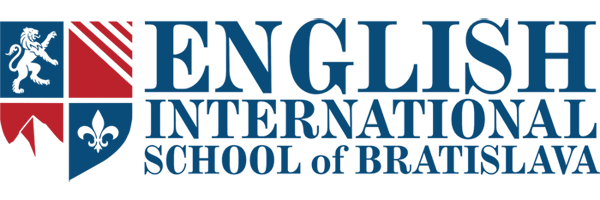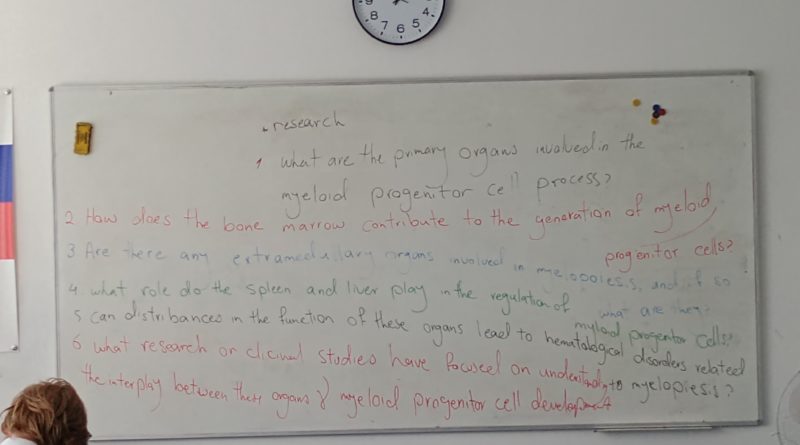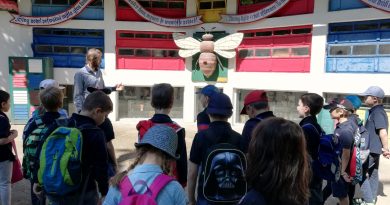Engaging Young Minds: MYP3 Biology Research Session at EISB
At the English International School of Bratislava (EISB), we believe in nurturing curiosity and fostering a love for learning through hands-on experiences. This philosophy was at the heart of our recent MYP3 biology research session, conducted during the third quarter of our science curriculum. This session was designed to immerse students in the scientific process, allowing them to explore biological concepts in depth while developing essential research skills.
Setting the Stage:
Introduction to the Research Session
The research session was introduced to the students with much anticipation and excitement. The third quarter’s focus was on various biological systems and processes, providing a rich backdrop for a hands-on research project. The session aimed to deepen students’ understanding of biology by engaging them in independent and group research, critical thinking, and scientific inquiry.
Our dedicated science teachers kicked off the session with an overview of the objectives and expectations. They emphasized the importance of the scientific method, from formulating hypotheses and conducting experiments to analyzing data and drawing conclusions. This foundation was crucial for guiding the students through their research projects.
Choosing Research Topics:
Fostering Curiosity
One of the first steps in the research session was helping students choose their research topics. To inspire them, teachers presented a range of intriguing biological themes and questions, such as:
- The impact of environmental factors on plant growth.
- Investigating the biodiversity of local ecosystems.
- Understanding the human digestive system through diet experiments.
- Examining the effects of different fertilizers on soil health.
- Exploring cellular respiration and energy production in organisms.
Students were encouraged to select topics that piqued their interest and aligned with their curiosity. This autonomy allowed them to take ownership of their learning, resulting in higher engagement and enthusiasm for their projects.
Research Methodology:
Guiding Scientific Inquiry
With topics chosen, the next phase involved developing research methodologies. Teachers provided detailed guidance on how to design experiments, gather data, and maintain scientific rigor. This included:
- Formulating Hypotheses: Students were taught to frame clear, testable hypotheses based on their chosen topics. This step involved background research and critical thinking to predict potential outcomes.
- Experimental Design: Students learned how to design controlled experiments, identify variables, and ensure reproducibility. This included selecting appropriate tools and materials, determining sample sizes, and establishing control groups.
- Data Collection and Analysis: Emphasis was placed on accurate data collection and proper documentation. Students were introduced to various data analysis techniques, including statistical methods, to interpret their findings.
- Ethical Considerations: Teachers highlighted the importance of ethical considerations in biological research, such as treating living organisms with care and ensuring experiments were safe and humane.
Hands-On Research:
From Theory to Practice
With their research plans in place, students embarked on the hands-on phase of their projects. This phase was marked by a flurry of activity as classrooms transformed into bustling research labs. Students worked individually or in small groups, setting up experiments, observing biological processes, and recording data.
For example, one group investigating the effects of light on plant growth set up different plants under varying light conditions. They meticulously measured growth parameters such as height, leaf size, and chlorophyll content over several weeks. Another group studying local biodiversity conducted field trips to nearby parks and forests, cataloging various plant and animal species and analyzing their findings.
Collaboration and Peer Review:
Enhancing Learning
Collaboration was a key component of the research session. Students regularly met to discuss their progress, share insights, and troubleshoot challenges. These interactions fostered a sense of community and encouraged peer learning. Teachers facilitated group discussions and provided feedback, helping students refine their methodologies and interpret their data.
Peer review sessions were also incorporated, where students presented their preliminary findings to their classmates. This process not only honed their presentation skills but also allowed them to receive constructive feedback and new perspectives on their work. The collaborative atmosphere enhanced the overall learning experience, as students learned to critically evaluate both their own and others’ research.
Presentation and Reflection:
Showcasing Discoveries
The culmination of the research session was a presentation day, where students showcased their projects to their peers, teachers, and parents. Each group created detailed posters or multimedia presentations that summarized their research questions, methodologies, findings, and conclusions. The presentations highlighted the students’ creativity, analytical skills, and depth of understanding.
During the presentations, students fielded questions from the audience, demonstrating their ability to think on their feet and articulate their knowledge. This experience not only reinforced their learning but also boosted their confidence and public speaking skills.
Reflection and Future Learning
Following the presentations, a reflection session was held. Students were encouraged to reflect on their research experiences, discussing what they learned, the challenges they faced, and how they overcame them. This reflective practice helped consolidate their understanding and identify areas for future improvement.
Teachers provided individualized feedback, praising the students’ efforts and offering suggestions for further exploration. They also highlighted the importance of continuous inquiry and lifelong learning, inspiring students to pursue their scientific interests beyond the classroom.
A Transformative Educational Experience
The MYP3 biology research session at EISB was a transformative educational experience for our students. It exemplified the power of hands-on, inquiry-based learning in fostering a deep understanding of scientific concepts and developing essential skills. By engaging in real-world research, our students not only enhanced their knowledge of biology but also cultivated critical thinking, collaboration, and communication skills.
As we look forward to future research sessions, we are excited to continue nurturing our students’ curiosity and passion for science. At EISB, we remain committed to providing enriching educational experiences that prepare our students for success in the ever-evolving world of science and beyond.




